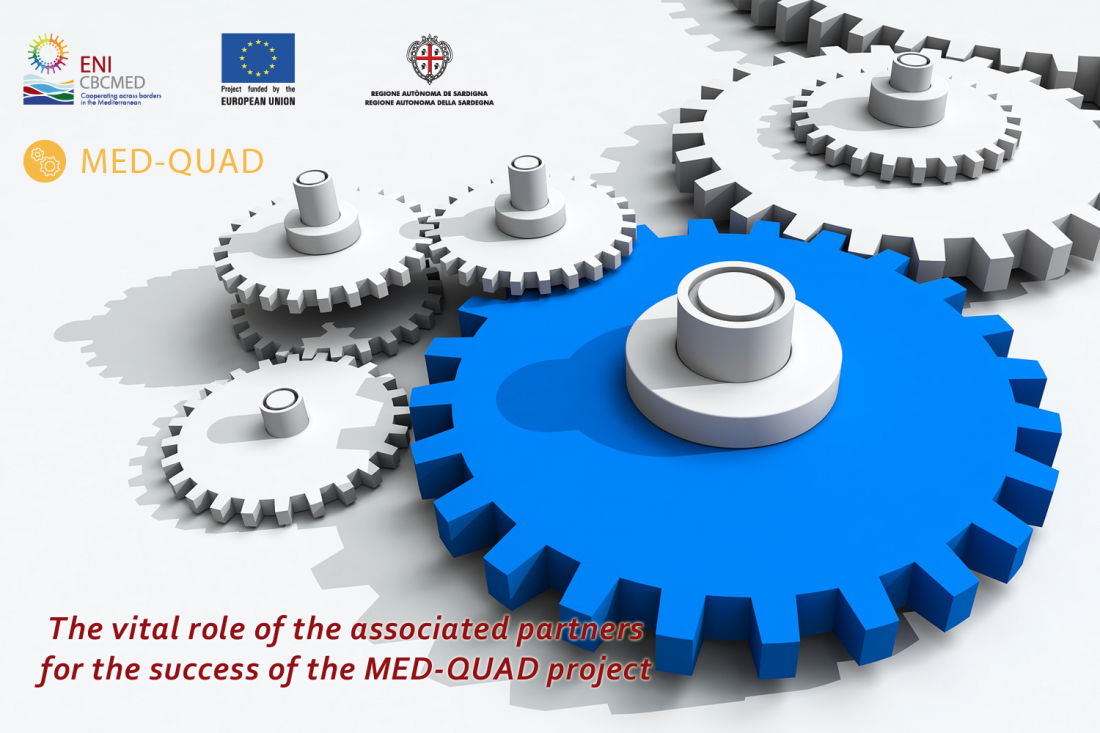The associated partners of MED-QUAD project enhances transnational cooperation in the Mediterranean. Learn how vital their role is!

Thanks to the financial support of the European Union under the ENI CBC Mediterranean program, the MED-QUAD project partners will implement activities aimed at the cooperation of academia, business, civil society and local government for the development of the digital economy in the sectors of water resources and cultural heritage.
In the MED-QUAD project, in addition to the seven partners, which consist of the coordinating partner Epimorfotiki Kilkis sm Llc (Greece) and the academic institutions: International University of Greece (DI.PA.E.), University of L'Aquila (Italy), Arab Academy for Science, Technology and Maritime Transport - AASTMT (Egypt), Al-Balqa 'Applied University - BAU ( Jordan), Palestine Polytechnic University - PPU (Palestine), University of Sousse (Tunisia), six additional partners from the participating countries will actively participate in a supporting role. So, which bodies will support the MED-QUAD project and what are their expectations from their participation in the project?
First of all, let us explain what the role of the associating partners is: the supporting organizations will cooperate voluntarily in the implementation of the project in terms of promoting the objectives of the project, contributing to essential decisions through participation in discussions and any meetings, monitoring the progress of the activities and the results of the project, the wider dissemination and utilization of the results but also in the multiplication of corresponding actions in the future. The MED-QUAD project will be supported by:
- Municipality of Kilkis (Greece)
- Comune dell'Aquila / Municipality of L'Aquila (Italy)
- Housing and Building National Research Center – HBRC (Egypt)
- Hebron Municipality (Palestine)
- Millennium Energy Industries – MEI (Jordan)
- Ministry of Higher Education and Scientific Research, MHESR (Tunisia)
The representatives of the supporting bodies will transfer their knowledge and experiences from their participation in previous transnational activities to the MED-QUAD project.
In particular, the involvement of Municipalities and Regions of the corporate group representatives in the "living labs" (which will operate as pilots under MED-QUAD in the partner countries) will catalytically contribute to implementing the research and the successful operation of the labs. The partners will implement innovative solutions in water management and cultural heritage through the pilot living labs. The associated partners will act both as a transmitter of information about the project in the local community and as a recipient of positive results that the project will create. (e.g. utilization of laboratory equipment, research results, innovative solutions to any difficulties there was, strengthening of knowledge and cooperation between the key players in the quadruple helix approach, improving citizens' quality of life). Thus, the expectations of associated partners are related to the intangible results that they will obtain from this transnational cooperation. E.g., exchange of knowledge and experiences, acquisition of new skills, formation of city development groups that project' partners will create for promoting the role of "socially aware universities" / civic universities). Also, the partners aim at the utilization (at local and transnational level) of the tangible results that the corporate scheme will create, and they are the following: living labs, joint projects between universities and SMEs, training of professionals in the field of entrepreneurship, circulation of valuable publications, innovative creation services.
The new perspectives that the MED-QUAD project will create in sustainable local development and innovation will make a significant contribution locally, regionally, nationally and transnationally. At this stage, the associating partners have already been informed of the project objectives by each partner. Also, they are making the first meaningful discussions regarding the design and equipment of the living labs.







